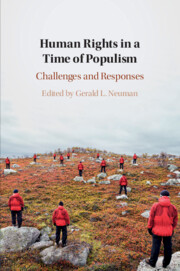Book contents
- Human Rights in a Time of Populism
- Human Rights in a Time of Populism
- Copyright page
- Contents
- Contributors
- Preface
- Acknowledgments
- 1 Populist Threats to the International Human Rights System
- 2 US Human Rights Policy and the Trump Administration
- 3 Rule-of-Law Rights and Populist Impatience
- 4 Populism and Human Rights in Poland
- 5 The Legal Architecture of Populism
- 6 Representation, Paternalism, and Exclusion
- 7 Penal Populism in Emerging Markets
- 8 The Populist Threat to Democracy in Myanmar
- 9 In Defense of Democratic Populism
- 10 Populism and International Human Rights Law Institutions
- 11 Human Rights Responses to the Populist Challenge
- Index
- References
2 - US Human Rights Policy and the Trump Administration
Published online by Cambridge University Press: 22 April 2020
- Human Rights in a Time of Populism
- Human Rights in a Time of Populism
- Copyright page
- Contents
- Contributors
- Preface
- Acknowledgments
- 1 Populist Threats to the International Human Rights System
- 2 US Human Rights Policy and the Trump Administration
- 3 Rule-of-Law Rights and Populist Impatience
- 4 Populism and Human Rights in Poland
- 5 The Legal Architecture of Populism
- 6 Representation, Paternalism, and Exclusion
- 7 Penal Populism in Emerging Markets
- 8 The Populist Threat to Democracy in Myanmar
- 9 In Defense of Democratic Populism
- 10 Populism and International Human Rights Law Institutions
- 11 Human Rights Responses to the Populist Challenge
- Index
- References
Summary
This chapter explores the effects of the Trump presidency in human rights foreign policy. Taking into account the mixed character of U.S. foreign policy in previous decades, it provides a measured account of how the populist rhetoric of “America First” was translated into concrete actions, initially under Secretary of State Rex Tillerson, and more intensely under National Security Adviser John Bolton and Secretary of State Mike Pompeo. The disorganization of the administration has left room for career officers to implement a relatively traditional human rights policy in some areas. The Trump administration has departed most significantly from past administrations in declining to embrace the core principles on which human rights policy is based. Its support of strongmen because of – not in spite of – their authoritarian qualities may leave its most distinct (and damaging) human rights legacy.
Keywords
- Type
- Chapter
- Information
- Human Rights in a Time of PopulismChallenges and Responses, pp. 20 - 42Publisher: Cambridge University PressPrint publication year: 2020

